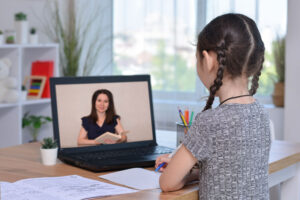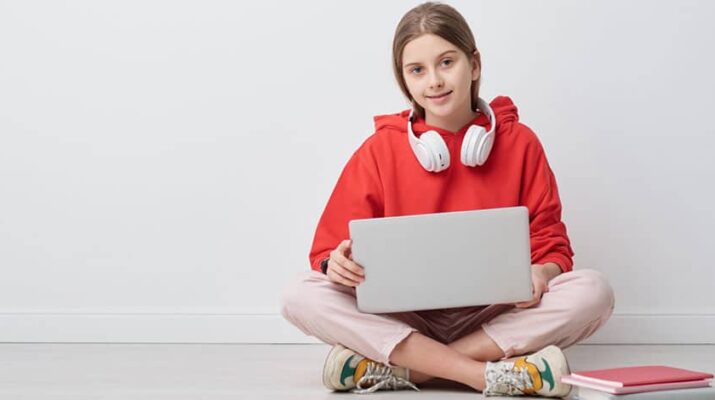Online classes are effective to contain the transmission of coronavirus but they are robbing kids from having the full school experience: interacting with others, developing connections, teamwork
By Deborah Jeanne Sergeant
 Attending school is more than learning academic subjects and physical education. For many children, it represents their main source of socializing opportunities with peers. Because of the pandemic, this important aspect of school has been indefinitely put on hold.
Attending school is more than learning academic subjects and physical education. For many children, it represents their main source of socializing opportunities with peers. Because of the pandemic, this important aspect of school has been indefinitely put on hold.
Even children who home school have lost face-to-face connections with those in their home school groups, clubs, athletic teams and other social outlets as these have been shuttered or at least curtailed during the pandemic.
While deemed necessary to curb the spread of coronavirus, online school presents a different dynamic to children.
They may be able to interact with teachers in real time and with each other on a limited basis, but they have lost the incidental socializing in a normal school day: chatting between classes, sharing stories over lunch, hanging out while waiting for the school bus, sitting with friends riding to and from school.
These moments may seem inconsequential; however, they help children learn and develop in many ways.
For the very youngest students, “these are critical years for them to develop socialization skills,” said Robert Nazario, licensed master social worker and supervisor of school-based services for Endeavor Health Services in Rochester and Buffalo.
“For kids that are just learning how to be verbal and express themselves, it’s critical in their emotional health. It’s been a setback for them. For older kids, it’s been isolating. The pandemic has isolated them and their families and that has led to a lack of services being provided — help they may need.”
A lack of social interactions — positive, negative and neutral — means fewer opportunities for developing emotional intelligence and skills that will help children navigate relationships of all sorts.
Unlike planned interactions with friends through technology (a Zoom meeting between best friends), the more spontaneous interactions in a school day (learning how to befriend an irksome classmate) tend to be more educational. Children also miss chances to develop teamwork skills.
“There’s not that natural progression of relationships and connections,” Nazario said.
He also sees the lack of in-person schooling as limited the safety net for families who need help with physical, mental, emotional and developmental needs, although wellness check-ins can help mitigate the effects.
Heather Paessler-Chesterton, Ph.D. and licensed mental health counselor in private practice in Rochester, said that social interaction with their peers is “how they get a sense of who they are with people and a sense of the world.
“We learn coping skills, creative problem solving and develop empathy for others,” she added.
Since the pandemic began, all of this — and more — shifted to the digital world. While those who are introverted may welcome reduced less pressure to engage with others and more barriers between themselves and social interactions, that may not be beneficial for their development. And for those who thrive on socializing, stunting these interactions can feel as if they are hamstrung.
“We are relational beings, but developmental beings, and that’s a lifelong process,” Paessler-Chesterton said. “We hope this is a short-term effect. As for the lasting effects, we can get back on track and things will wash out.”
She encourages parents to stay attentive to their children’s emotional needs and watch for any signs of depression or anxiety, such as changes in eating and sleeping habits and extreme changes in behavior beyond the garden variety acting up or regression.
Paessler-Chesterton thinks that taking time to pay attention to each child one-on-one can help mitigate the effects of fewer peer interactions. Especially for older children whose peer groups are even more important, it can help to connect through Facetime or Zoom with friends.
Andrew Bellush, licensed mental health counselor at Genesee Behavioral Health Center Children and Youth Program through Rochester Regional Health, calls social interactions with other children “a way to recalibrate their social-emotional systems. Kids don’t typically get to explore all the pieces of themselves within their own family system, as their role is too concrete or established in some sense. Being amongst their peers helps stimulate other pieces of their own personality.”
These interactions let them discuss shared and differing interests and home lives and practicing their social skills. Bellush said that is how children work on their emotional development. When these opportunities cannot happen, parents can help fill in some of the gaps.
“Parents can take on a more playful role with their children right now to help mitigate these effects,” he said. “Many playgrounds, parks, the zoo, skating rinks, gyms and pools are opening up again.”
Although it is not the same as peer interactions, taking time for one-on-one interaction with the children can help them feel better connected. Bellush also suggested considering expanding the “social bubble” so children can have a few playmates, providing this follows current health guidelines.
At this point, it is difficult to tell how long-lasting the effects of limited socialization may be. That is why Nazario believes there has been a greater push to resume in-person classes.
“Children are resilient,” he said. “Families have shown their resiliency. My hope is that with kids getting back to school, even if in a hybrid schooling, that they can get back to where they need to be developmentally, academically and socially-emotionally. I hope those skills will come back as well.”

